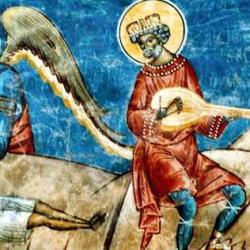Explaining the numerological structure of Psalm 72, C. J. Labuschagne points out that the Psalm has 17 verses and adds, “The 17-word doxology, together with its 2-word conclusion . . . ‘Amen, Amen’ (vs. 18-19), brings the total number of words of the entire poem up to 156 (6 x 26), which was obviously consciously designed. The numerical structure shows that the 1-word heading and the 5-word editorial note (v. 20) do not play any role at all in the numerical structure of the psalm.”
17 and 26 are, as Labuschange has explained in his Numerical Secrets of the Bible, are the numerical value of kavod (“glory,” sometimes used as a substitute for God’s name) and Yahweh respectively.
He notes that the numerology point to the center of the Psalm:
In terms of the 137 words of the psalm proper, the middle word is . . . Sheba, significantly flanked by 68 (4 x 17) words: 137 = 68 + 1 + 68. The name Sheba appears to have been intentionally devised as the meaningful centre of the poem on word level. The name Sheba may be regarded as representing all foreign rulers who are familiar with Solomon’s fame and acknowledge his hegemonic rule. The name Sheba is a most fitting meaningful centre for a poem dedicated to king Solomon, especially in light of the story about the visit by the queen of Sheba (I Kings 10:1-13). It is particularly interesting to note that the concentric compositional formula, with Sheba flanked by 68 words (4x the divine name number 17) on each side, seems to suggest that Sheba is symbolically enveloped by YHWH’s name. This may be linked with the remark in I Kings 10:1 that “the queen of Sheba heard of the fame of Solomon concerning the name of YHWH.” The Deuteronomistic storyteller, on his part, wanted to stress that the reason for her visit is not Solomon’s personal fame, but the fame of what he did for the name of YHWH, i.e. building the temple.
Given this center, the Psalm highlights the submission of the king’s enemies, but this is set “within the context of his realization of justice in general. The rule of justice does not only benefit the king and his land, but also, more particularly, the oppressed and the needy.” Thus:
A.The king’s deeds for the benefit of the people, vv 1-4 (26 words)
B. The blessings for the king and his land, vv. 5-8 (30 words)
C. The submission of the king’s enemies, vv. 9-11 (23 words)
A’. The flourishing of justice for the oppressed, vv. 12-14 (22 words)
B’. The blessings for the king and his land, vv. 15-17 (36 words)















